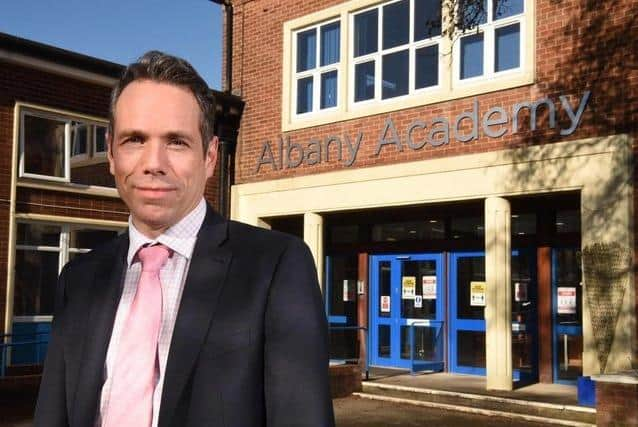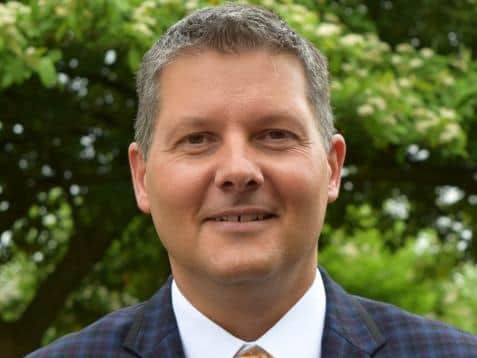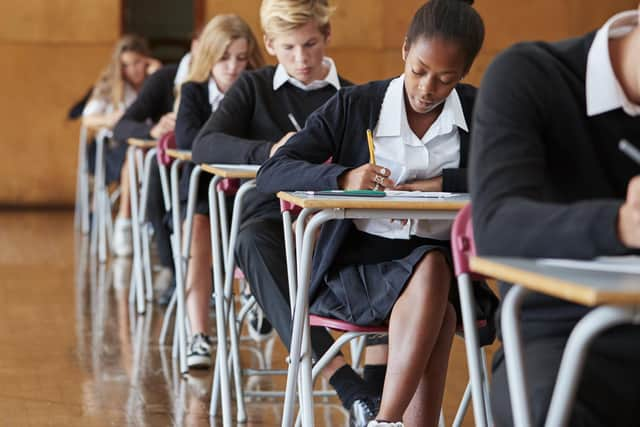Chorley headteachers react to latest exam changes
and live on Freeview channel 276
Last week, the government announced its plans for 2022 and 2023 school exams, causing a mixed reaction from two Chorley headteachers.
Whilst in hall terminal examinations will be returning for both A levels and GCSE's from 2022, pupils sitting exams next year will also be getting notice of exam topics in some subjects to aid revision, with other subjects offering a choice of topics in the exams themselves, or exam aids such as equation sheets.
Advertisement
Hide AdAdvertisement
Hide AdThe government also confirmed that although there will be more lenient grading than before the pandemic to make up for Covid disruption, next year's results will be wound back to a ‘mid-point’ between 2019-2021 after 2 years of grade inflation, with results expected to return to "normal" by 2023.


To provide an example of the 'grade inflation' seen over the past few years, 44.8% of UK A-level entries were awarded an A or A* grade in 2021, compared with 38.5% in 2020, and 25.5% in 2019, the last year that exams were ran before the pandemic.
The headteacher of Parkland's High School in Chorley, Steve Mitchell says he is disappointed with the return to terminal exams and adjustment to lower exam grades, although it is "not unexpected."
Steve explained: "Unlike many of our European counterparts, our reliance on exams for 16 year olds is at odds with other high performing countries. The pandemic has given us in education a perfect opportunity to reflect on how we assess students, what GCSE results really tell employers and 6th form colleges/universities, but that opportunity seems to be going to waste.


Advertisement
Hide AdAdvertisement
Hide Ad"It would take brave leadership in government to unpick the issue of assessment and introduce a system which is fair to those who flourish under exam conditions and those who perform much better during regular assessment periods throughout the academic year.
"Our experience of the past two years has shown how many students can achieve excellence when formally assessed regularly; this is not grade inflation, it's students performing at their absolute best at regular intervals rather than assessing them by means of a terminal exam, held in the sports hall, which can make or break their future."
Peter Mayland however, the headteacher of Albany Academy in Chorley, welcomed the return to terminal exams as it creates a more even playing field.
He explained: "Generally speaking, what exams should do is provide that fair system because everyone’s doing the same assessment, but they've also got to be marked in the same way and in the last couple of years, that’s not been the case because, although teachers have had guidance on what to base assessments on, they could have been based on many different things, so a return to the usual exam system is fairer because everyone gets the same diet and marking."


Advertisement
Hide AdAdvertisement
Hide AdAs well as the return to the exam system, Peter also believes the changes to exam procedures and retention of more lenient marking next year are a good thing, but admits he is concerned by the government's plans for 2023.
Peter said: "In terms of the changes for 2022, they’re positive because they do acknowledge the disruption that has occurred in the past 18 months and is still ongoing, and I think reducing what's being assessed, and giving notice about that, is going to really help in terms of exam preparation, it’s not about reducing what's being taught, but it will make exams fairer next summer given the amount of different disruption that students have faced.
"In terms of grade inflation, my broader view is that students should be awarded for the marks that they achieve, not how grades retrofitted to a model, having said that, given that that is the system we operate in, I think staggering it next year with a middle step is a good thing, because again it reflects the disruption that’s taking place.
"My only concern is that in 2023, those students, who are now in year 10 or 12, will still have suffered. Their educational experience is not equivalent to students that sat GCSE's and A levels in 2019, so I think there should still be some measures there, whether that be around still publishing the topics that are going to be examined or other similar measures."
Advertisement
Hide AdAdvertisement
Hide AdThe announcement from the Department of Education last week comes following two years of cancelled exams and teacher-assessed grades, caused by the pandemic.
Although exams are intended to take place next year, the government and Ofqual have also published proposals for using teacher-assessed grades as a contingency measure if exams cannot run, with a consultation on proposed contingency plans running until October 13.
